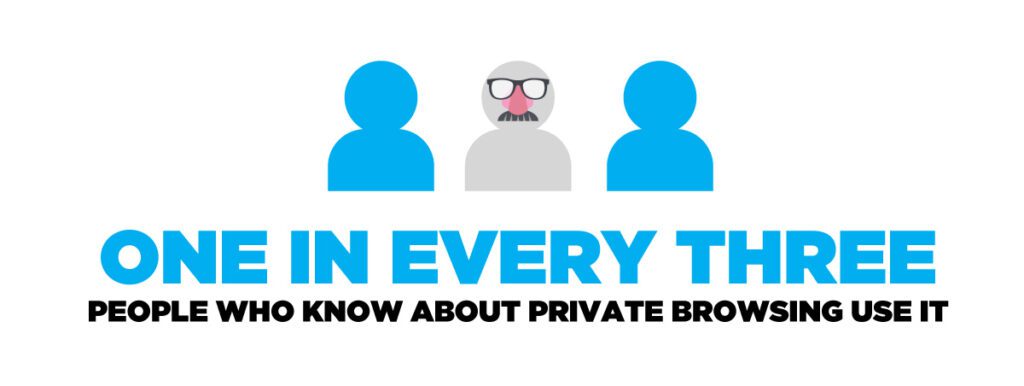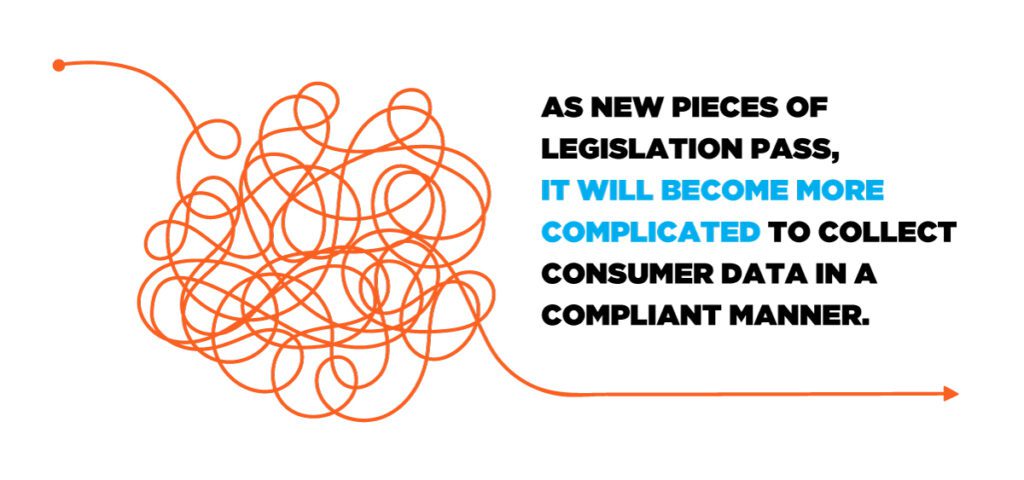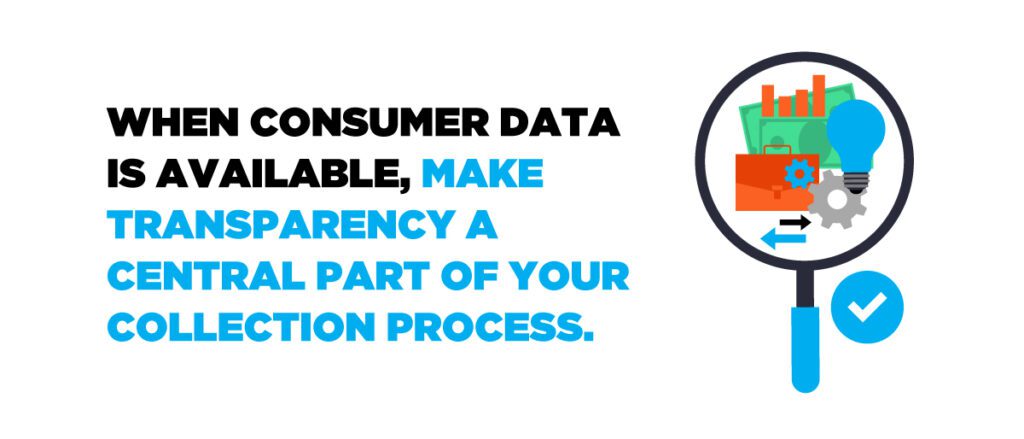Internet users today are more aware of online security threats than ever before. They want to keep their online activity private, their login information protected, and their data from being collected. This is part of the reason that private browsing has become so widespread; surveys have revealed that one of every three people who know about private browsing use it.

Privacy concerns are likely to remain at the front of people’s minds as technology becomes an increasingly prominent part of life. But what does private browsing mean for digital marketers who rely on search engine data to fine tune their SEO strategy, website content, and ad campaigns? In short, it means that you may have to adapt your online marketing strategy to accommodate your consumer’s desire for browsing privacy.
Here, we’ll discuss the following topics and explain how digital marketing is bound to change with the ushering in of the new digital marketing privacy era:
- What is Incognito mode?
- Why does Incognito mode exist?
- Does Google track you in Incognito mode?
- How does Google Incognito mode work?
- Does private browsing hide your IP address?
- Can Incognito mode be traced?
What Is Private Browsing and How Does It Work?
Private browsing (also known as Incognito mode, Google’s version of private browsing) isn’t actually as private as it sounds. Internet users sometimes confuse the function of a private browser with that of a VPN, which conceals your online identity. While a private browser can’t make you anonymous on the internet, it can hide your browsing history from those who have access to your computer while also preventing websites from tracking you and storing your login credentials. In private browsing mode, search engines can still see your location, IP address, and login history, which means some private browsing data is still available to digital marketers.
When you use a private browser, you start a temporary session that is separate from your main browser and local data. Terminating the session will clear your search history, file downloads, cookies, and browsing history so that anyone who uses the device after you will not be associated with or have visibility into your data or history.
Why Do People Use Private Browsers?
Today, most browsers have a private browsing feature, including Chrome, Mozilla Firefox, Safari, and Internet Explorer. Alternative search engines like DuckDuckGo automatically protect user data without requiring a manual switch to private browsing. People use them for a variety of reasons, such as to shop online for someone without ruining the surprise, research sensitive information, or safely use a public computer at a library or a university. Private browsing is also convenient if your nosy friends or relatives have access to your computer.
Digital Marketing and Consumer Data Privacy Laws
Despite the fact that many consumers have turned to private browsing, their internet activity can still be tracked through the use of cookies. A cookie is a small file that a website stores so that it can recognize your device in the future and provide a more custom experience based on your browsing habits. Digital marketers must use this data cautiously; now that so much of life happens online, there are more internet regulations and laws going into effect that restrict the way this data can be used.
As a digital marketer, you need to thoroughly understand data privacy laws so you know what you can and can’t do in relation to them. While there aren’t currently any wide-reaching federal laws, there are two broad consumer protection regulations that all digital marketers should be aware of; the following pieces of legislation regulate the collection and use of private data for marketing and carry penalties for violation:
- The General Data Protection Regulation: This law, passed by the European Union, is the most strict data privacy law in the world. If a marketer collects web data on someone located in the EU, they must abide by an extensive set of guidelines. Visit the EU’s webpage on this regulation to familiarize yourself with the legislation.
- The California Consumer Privacy Act: This law gives Californian internet users the right to know how a business collects, uses, and shares their internet data and allows them to opt out of their data being sold. Violating a California resident’s rights under this act could result in litigation.
Additional laws are cropping up all over the world. As new pieces of legislation pass, it will be increasingly more complicated to collect consumer data in a compliant manner. For marketers, it will be equally as important to have a backup plan for your marketing strategy as it will be to stay up to date with new laws.

The Future Impact of Private Browsing on Digital Marketing
There used to be a time when you could track your target audience’s every move on the internet, but that isn’t the case anymore. Data collection is getting more difficult by the day. As more restrictions on consumer data usage fall into place, marketers will inevitably have to find alternative ways to target their audiences without depending so much on analytics.
This means you may eventually have to adopt the old-fashioned marketing method of casting a wide net and marketing to broader audiences, focusing more on high-quality messaging that attracts the general public.
Tips for Adapting Your Marketing to Consumer Privacy Laws
In the years to come, marketers will need to focus more on innovation and responsible data collection when it comes to their target audiences. Here are some simple tips for reaching your marketing goals without violating any consumer protection laws.
Increase Your Emphasis on Transparency

When consumer data is available, make transparency a central part of your collection process. This means providing a clear and concise privacy policy on applicable websites and obtaining people’s consent before using their data by allowing them to opt in or opt out of data exchanges, email communications, and more.
Make Your Content Attractive to Larger Demographics
Over the past decade, digital marketing has been focused on targeting groups of small, specific audiences. In a world where demographic-specific data is no longer available, you’ll have to start targeting larger groups simultaneously with more creative, higher-quality content. You may also need to start running multiple ads from different angles to find out what resonates most with general audiences.
Focus on Brand Awareness and Recognition
As you start targeting general audiences, it’s important to perfect your brand messaging and connect with internet users frequently. The more your brand is seen in the world, the more likely people are to remember it; repeated exposure will help your brand recognition and generate leads from a broader pool of potential customers.
Consider the Bigger Picture
Adapting your marketing strategy to new industry standards provides you with an opportunity to take a step back and look at the big picture. Instead of evaluating small-scale elements of your various campaigns, you can instead start looking at higher-level success metrics, such as your customer satisfaction and return on investment, to see how you’re performing with the general public.
Partner With Avalaunch Media to Fine Tune Your Marketing Strategy
As of today, data-driven marketing is still alive and well — and until that ceases to be the case, the future impact of increased regulation will remain largely unknown. For the time being, your biggest challenge will be to prepare by reconciling your marketing practices with consumer data privacy laws. One way you can do that is by focusing on big-picture marketing. While your brand will need to make adjustments for compliance purposes, the fundamentals of digital marketing remain unchanged.
Avalaunch Media is home to dozens of brilliant marketing minds with years of experience strategizing with brands of all sizes. Our adaptable team is knowledgeable in all areas of digital marketing and is ready to work with businesses like you in ushering in this new era of high-level digital marketing. Contact us today to find out how we can help you launch your brand and help you soar to new heights while maintaining compliance!
